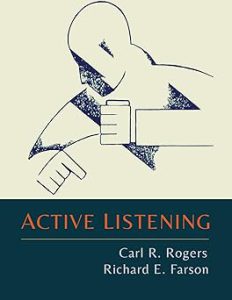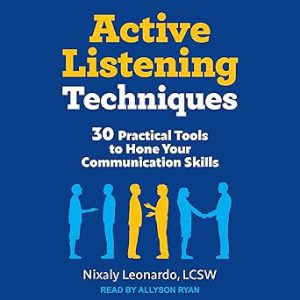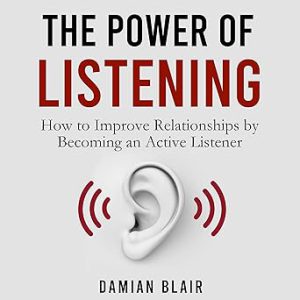The fast-paced technological world today fails to recognize active listening as a crucial workplace skill. Digital communication advancements such as emails and virtual meetings have led us to develop multitasking habits while waiting for our speaking opportunities. The ability to actively listen remains an essential component of effective communication which deserves proper attention. Active listening functions as a crucial element for creating strong workplace relationships while supporting teamwork and increasing productivity.
This blog post explores the role of active listening in the workplace while demonstrating how learning this technique can lead to significant professional achievements.
What is active listening?
Effective communication depends heavily on the ability to attentively listen and comprehend what others convey. Merely hearing someone’s words doesn’t suffice; you must also observe their nonverbal cues and emotional expressions. Through active listening you gain insight into their emotions and objectives as well as their concealed intentions.
Active listening demonstrates to others that you value both their time and their ideas. They become more at ease with sharing their thoughts with you. Responding in a way that demonstrates your comprehension and desire to keep the conversation going is essential. Demonstrate your understanding through summarization of their words or by asking clarification questions and offering supportive remarks.
Active listening has many benefits. Active listening enhances communication by eliminating misunderstandings and enabling people to understand each other more clearly. Active listening facilitates healthy relationship building through the development of empathy and mutual understanding. Active listening increases your chances of resolving problems and making effective decisions. The ability to understand diverse perspectives enables people to create solutions that are both creative and cooperative.
Active listening skills
Three Easy Steps to Improve Your Listening Skills
Improving our listening skills in different situations can be greatly improved by practicing three important techniques: paying attention, staying open-minded, and being flexible. We should examine each method to learn how they will help improve our listening skills.
Attention:
The initial step to improve listening skills requires maintaining intense focus on the person speaking. We can become better listeners by eliminating distractions and concentrating on the speaker’s words. We must avoid distractions from our phones or our own thoughts about our next words. Our full attention to the speaker demonstrates respect and communicates that their words hold value for us.
Attitude:
The emotional state we maintain during listening sessions dictates the direction and quality of our conversations. A positive and open mindset enables us to engage in meaningful dialogues. This means being understanding, empathetic, and patient. By approaching discussions with an openness to learning and respecting other viewpoints we enable them to share their thoughts freely in a safe environment.
Adaptability:
We must adjust our listening techniques to fit various situations and interact with different individuals effectively. In certain situations we need to concentrate and think before we respond but in others we should let the speaker continue without too many interruptions. Approaching communication with openness to various listening methods enables us to comprehend and react appropriately to spoken messages.
These extra tips will help you develop better listening skills together with the three A’s.
Focus on the speaker by keeping eye contact during conversations. We demonstrate our attention and interest through our gaze.
- Ask clarifying questions: To ensure complete understanding of what the speaker says we need to ask for clarification when something is unclear and request more information.
- Reflective listening: Summarizing or rephrasing another person’s words demonstrates our comprehension while acknowledging the significance of their thoughts.
- Practice patience: The speaker may require some time to organize their thoughts for a clear explanation. The opportunity to express thoughts and feelings at one’s own pace allows open and honest conversations to flourish.
Be mindful of non-verbal cues. Observe someone’s speech patterns as well as their tone and inflection during conversation. You can learn a great deal about people’s emotions and their intended message through their non-verbal signals. Understanding these signals can be really useful.
Your listening abilities will grow stronger only with dedicated time and deep concentration. Three crucial elements for connecting with others include paying attention while maintaining a positive mindset and demonstrating flexibility. We should dedicate ourselves to improving our listening skills and understanding how important attentive listening really is.
Why Active Listening is Essential for Workplace Success
People tend to overlook the value of attentive listening in modern workplaces which constantly operate at fast speeds and change frequently. Business success depends equally on listening skills alongside speaking and presenting abilities. By spending time listening to one another people create a collaborative space where ideas can flow freely. This article explains the significance of active listening in professional settings and describes the advantages it provides for both employees and organizations.
1. Building Trust
Your team will experience happiness when you reach your desired objectives. Business owners measure their company’s health with this while employees focus on accomplishing their tasks successfully. A workplace relies on coworker trust for effective collaboration.
To gain people’s trust, we need to:
- Listen carefully and pay attention.
- Be honest and supportive.
- Avoid being judgmental.
- Keep communication open.
Understanding these criteria requires us to listen attentively. Building trust requires consistent communication and action.
2. Productivity
Workplace productivity sees significant improvement through active listening techniques. Ignoring employee ideas and thoughts by managers leads to workplace dissatisfaction and reduced productivity. Managers need to deliver effective feedback while attentively listening to their employees to create a positive and productive work environment. Strong communication within the organization plays an equally important role in building trust and understanding. Both parties must engage in effective listening and clear communication because this situation functions like a two-way road.
3. Resolves Conflicts
Disagreements and accidents can happen at work. A misunderstanding may be easy to solve at times but it can become a major problem at other times.
People naturally develop different viewpoints which leads to misunderstandings between them during work activities. This can lead to arguments and conflicts. Open discussion combined with attentive listening enables us to address and resolve these problems.
We struggle to comprehend others’ feelings because we lack their perspective. At times we believe our abilities or opinions surpass those of others. Through careful listening to each other we gain understanding and appreciation for diverse perspectives. Problem solving becomes more effective when we listen and this creates a respectful environment for everyone at work.
4. Strong Work Relationship
To enjoy your work environment you need to maintain positive relationships with your fellow employees. In 2003, Faye Doell found out that there are two types of listening: ‘listening to understand’ and ‘listening to respond.’
By listening to understand others we create stronger connections and demonstrate our ability to empathize. Our work relationships benefit from this practice. Employees who practice this behavior throughout a company will build stronger connections with their colleagues.
5. Self-empowerment
Creating your own self-empowerment will boost your confidence while enabling you to achieve personal goals. When you practice active listening and identify work advantages you gain a wider perspective that leads to increased empowerment. The improved awareness enables you to engage with your colleagues and organization members in both comfortable and confident ways.
6. Acceptance
Each employee at a company contributes to its unique operational style. This approach to doing things rests on acceptance and open-mindedness. All members of the company must share identical goals and beliefs.
Company success requires leaders and employees to share common goals. Their teamwork requires respectful behavior and active listening throughout their work process.
New employees must receive encouragement to present their suggestions for company improvements as they join their new workplace. This process will create an environment where they feel less stressed and more at ease. When you listen to them their motivation levels will increase.
Are you listening carefully?
People commonly assume they excel in listening skills yet they usually listen with the intention of getting a chance to speak. Employees rarely demonstrate their understanding of shared information because they don’t spend sufficient time doing so. Active listening serves as a crucial life skill which proves especially beneficial in professions that require regular interaction with other people. Active listeners focus on spoken words and unspoken messages while understanding context through nonverbal signals to deliver suitable responses to conversation topics and tones. Seeking assistance from a human resources professional can be beneficial when you face challenging situations at work. As you lead the conversation you need to observe their nonverbal behavior to confirm whether they are actively listening. The person listening should demonstrate their attention through eye contact and nodding gestures. Passive listening occurs frequently when people daydream during extended meetings which often results in unanswered questions after the meeting.
How Active Listening Skills Enhance Employee-Manager Relationships
Your relationship with your line manager will benefit greatly from possessing strong listening skills. Employees tend to remain in their positions when their managers express appreciation and value toward them. Team performance improves when managers demonstrate genuine interest in their employees as individuals. You need to focus on listening carefully to their input. This approach will result in improved productivity and enhanced resilience and creativity within teams.
Consideration From Within The Role Of The Employee
Employees need to demonstrate to their supervisors that they understand and adhere to given instructions. When tasks require immediate attention your boss may not have the opportunity to repeat instructions. The key to effective job performance lies in understanding the exact tasks you have to complete and knowing their purpose.
Through active listening you can discern how this task supports the company’s overall objectives. Your work approach may shift as a result of this understanding.
Career advancement opportunities arise from actively listening to your bosses and co-workers. Attending meetings becomes dull when they cover topics related to your work which has already been addressed. When you focus on what you hear you can discover innovative ideas or ways to improve things.
Conclusion
The ability to listen well stands out as an essential skill that strengthens both personal development and our interpersonal relationships. Active listening enables us to strengthen our relationships and gain insights from varied perspectives and experiences. When having conversations we need to practice empathy together with showing genuine interest and preventing any distractions. Enhancing our ability to listen well opens doors to more substantial conversations and helps us build stronger relationships with our peers. We should work towards becoming excellent listeners so we can establish a supportive and understanding space for everyone.




